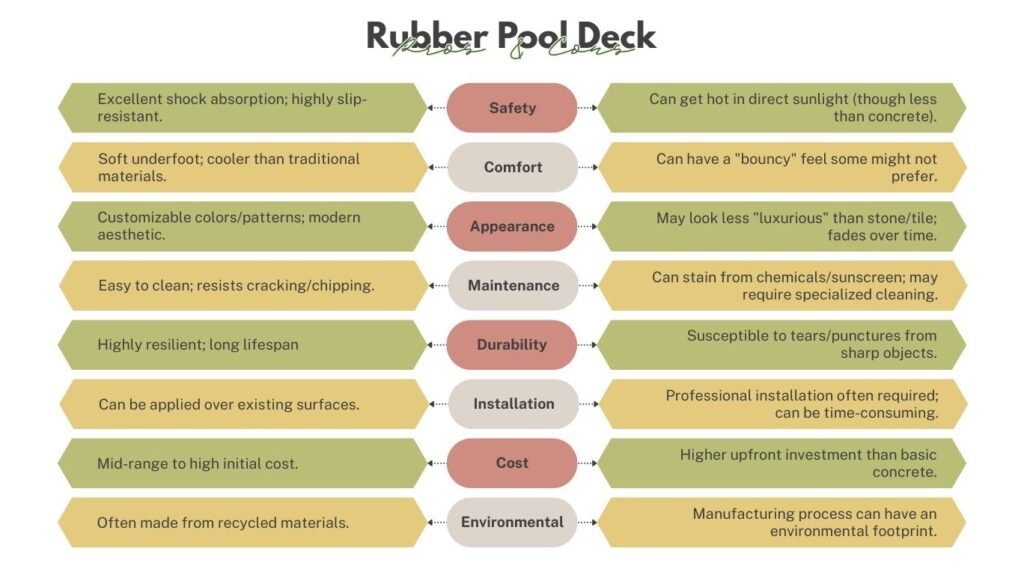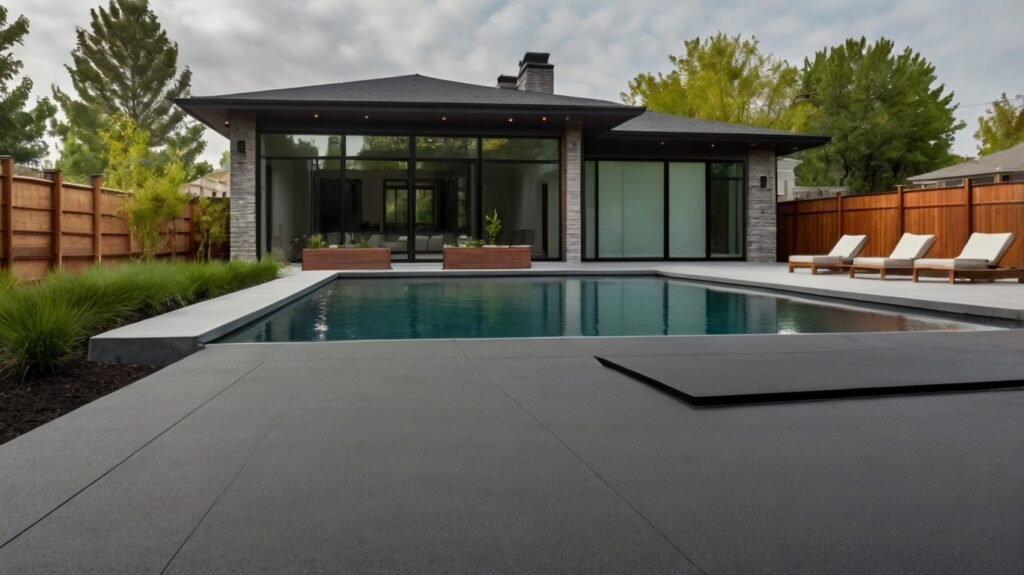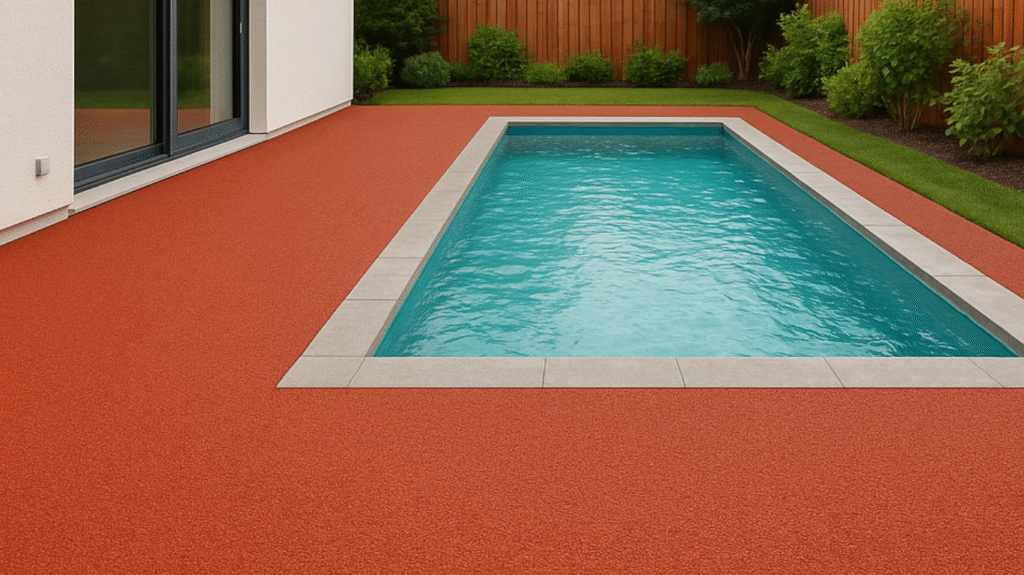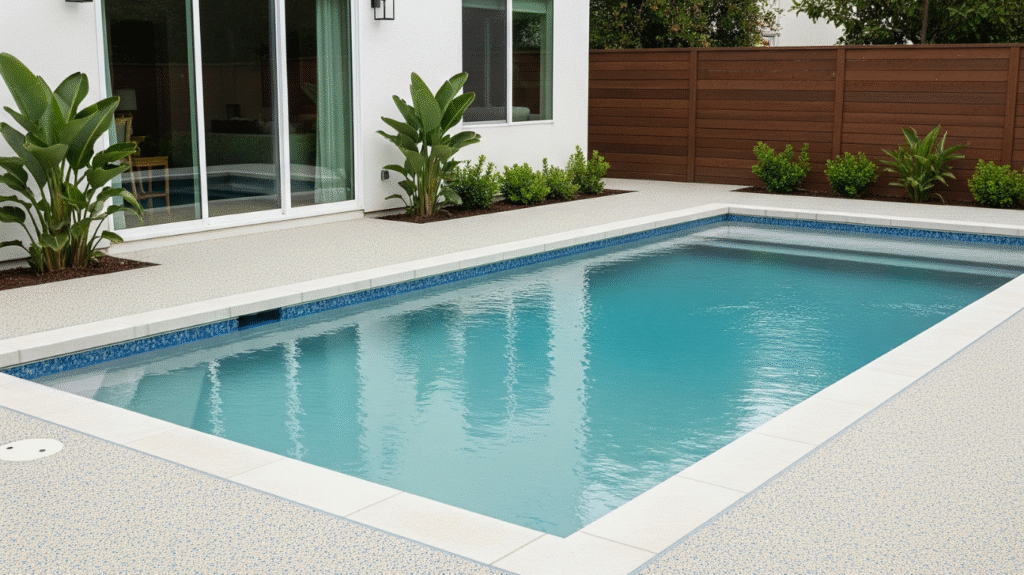Many pool owners want non-slippery deck surfaces without losing the durability and resistance to harsh chemicals that concrete provides. But concrete pool decks are not elegance or comfort at their finest. To solve the problem, rubber pool deck is introduced.
Due to rubber expanding or contracting feature, it is resistant to cracking and chipping that may occur in traditional concrete pool decks. Rubber pools are also flexible, making them perfect for uneven or sloping surfaces.
Is Rubber Pool Decking Worth It?

As the rubber have every quality of a perfect pool deck to be included, the decision to use rubber pool decking is not bad. You can enhance the appearance of your pool area and also enjoy the safety, comfort, and durability that rubber provides. Here are some pros and cons to consider before resurfacing to rubber pool decking:
Pros:
- Safety: Rubber pool decks have a slip-resistant surface, making it safer for everyone, especially children and elderly individuals. This can greatly reduce the risk of accidents and injuries in and around the pool area.
- Comfort: The soft and cushioned surface of rubber provides a comfortable place to walk, stand or sit on. This is especially beneficial for those who spend long hours at the pool, such as during parties or gatherings.
- Durability: Rubber is known for its durability and longevity. It can withstand harsh weather conditions, heavy foot traffic, and exposure to water without cracking or fading. This means that your pool deck will look good and last for years to come with minimal maintenance needed.
- Easy Installation: Rubber pool decks can be installed quickly and easily, without the need for heavy machinery or specialized tools. This makes it a great DIY project for homeowners looking to save on installation costs.
- Variety of Designs: Gone are the days of plain black rubber flooring. Now, there are endless design options available for rubber pool decks that can add style and personality to your outdoor space. From speckled patterns to vibrant colors, you can customize your pool deck to suit your personal taste and complement your existing outdoor decor.
- Durable and Low Maintenance: Rubber pool decks are incredibly durable, able to withstand harsh weather conditions, heavy foot traffic, and exposure to pool chemicals. They also require minimal maintenance, with no need for frequent sealing or re-staining like traditional wood or concrete decks. Simply sweep or hose off any debris and you’re good to go.
- Slip-resistant Surface: Safety is a top priority when it comes to pool decks, and rubber flooring offers excellent slip-resistance even when wet. This makes it a popular choice for families with children who often run around the pool area.
- Comfortable Underfoot: Unlike hard surfaces such as concrete or tile, rubber decking has a softer and more cushioned feel underfoot. This makes it more comfortable for pool-goers to walk on, especially for extended periods of time.
- UV Resistance: Rubber decking is also highly resistant to UV rays, making it an ideal choice for outdoor areas that are exposed to direct sunlight. This means your pool deck will maintain its color and appearance over time without fading or discoloration.
- Durability: Rubber flooring is known for its durability and longevity. It can withstand heavy foot traffic, extreme temperatures, and harsh chemicals commonly used in pool maintenance without showing signs of wear and tear. This makes it a cost-effective option in the long run as it requires minimal repairs or replacements.
Cons:
- Installation: Installing rubber flooring can be a labor-intensive process and may require professional help. This adds to the cost of the rubber flooring.
- Maintenance: Rubber flooring requires regular cleaning to prevent mold and mildew growth. It also needs to be sealed periodically to maintain its water-resistant properties.
- Temperature sensitivity: In hot climates, rubber flooring can absorb heat from the sun, making it uncomfortable for barefoot walking. It may also feel cold to touch in cooler temperatures.
- Limited color and design options: Unlike other flooring materials, rubber has a limited range of colors and designs available. This may limit the aesthetic choices for your space.
- Environmental impact: Rubber flooring is made from synthetic materials, which can have a negative impact on the environment. It is important to consider eco-friendly alternatives if sustainability is a priority for you.

Material Types Used in Rubber Pool Deck:
Not every rubber type is suitable for outdoor use, especially in a pool deck setting where it will be exposed to water and sunlight. Here are the three most commonly used rubber types for pool decks:
EPDM (Ethylene-Propylene-Diene Monomer):
This is a synthetic rubber that is resistant to UV radiation and can withstand –40 °C to 150 °C temperatures. It is commonly used in pool decks due to its high durability and resistance to weathering. EPDM rubber also has a low environmental impact, making it a popular choice for those looking for sustainable options.

SBR (Styrene-Butadiene Rubber):
SBR is a synthetic rubber that is known for its high strength and excellent resilience. It is commonly made recycled tires that have been shredded and mixed with chemicals to create a durable material. SBR has a lower cost compared to other rubber materials but it is still highly durable and resistant to UV rays, chemicals, and temperature changes.

Poured-In-Place Rubber Surfacing:
It is most common coating used in outdoor playgrounds, parks and recreational areas. It is made by the combination SBR and EPDM rubber granules which are mixed with a binding agent and poured in place to create a seamless, cushioned surface. This type of rubber surfacing is highly durable, slip-resistant, and shock-absorbent making it ideal for outdoor areas where safety is a priority.

How Long Does it Last?
The rubber pool deck coating has a lifespan of 8-15 years on average when properly maintained. It is important to regularly clean and inspect the surface for any damages or wear and tear. Any cracks or tears should be repaired immediately to prevent further damage and ensure the longevity of the coating.

Remarks:
The rubber pool decks not only provide safety and durability, but they also require minimal maintenance. This makes it a cost-effective choice in the long run compared to traditional concrete or wood surfaces. Additionally, the vibrant colors and design options of rubber surfacing can enhance the overall appearance of your outdoor space, making it both practical and aesthetically pleasing.
